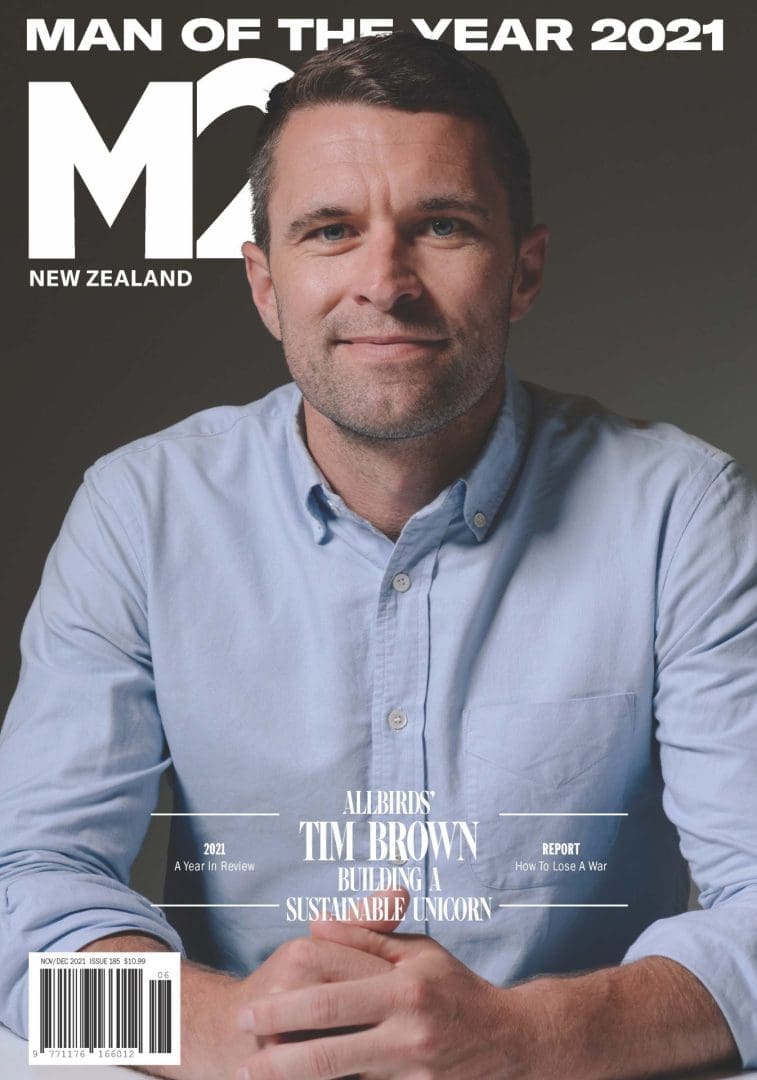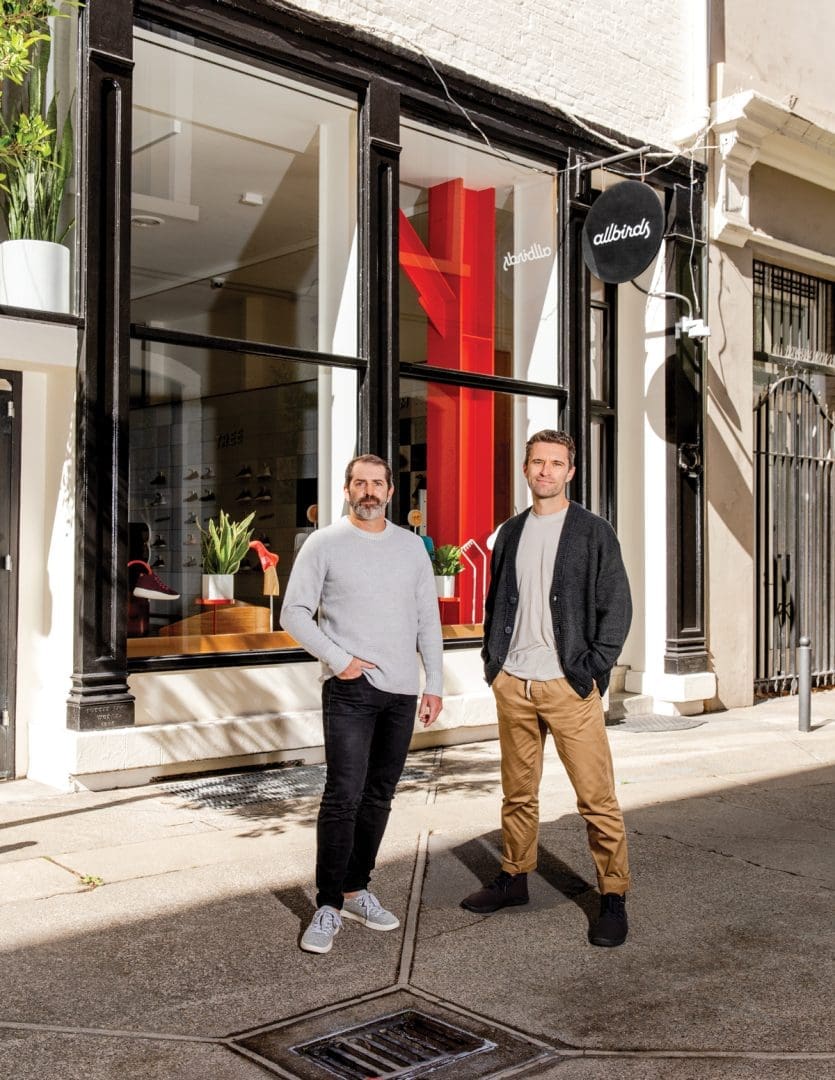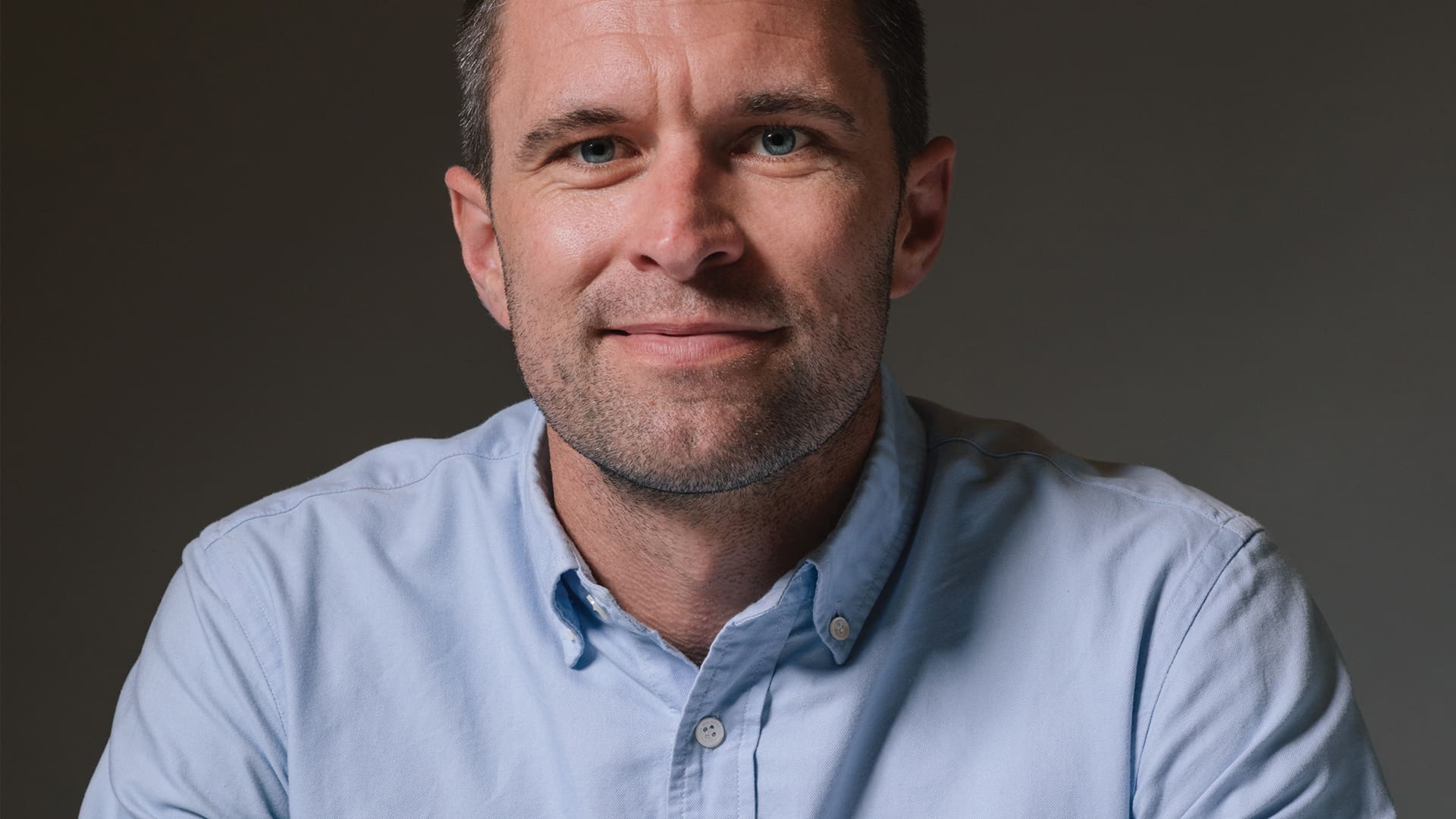Our M2 Man Of The Year 2021 – Tim Brown
Over the years, we have M2 Man Of The Year winners from a range of areas of excellence and impact from business, environmental, social, sporting, entertainment, technology and even rocket science. But the M2 Man of the Year 2021 winner, Allbirds Co-Founder Tim Brown, has had a journey that intersects many of the areas. His vision has created a style icon, a startup unicorn, disrupted an industry, rewritten the rules for business collaboration and competition, and created new transparent and sustainable pathways of production.
Tim shares some of the lessons he has learnt along the way, from professional soccer player to the Co-Founder of a company that has set the footwear industry on a
new path.
When you think about the journey and the scale of what you have achieved already, what’s been your proudest moment so far?
Since the start of Allbirds, we’ve had Obama, Leonardo DiCaprio, Emma Watson and a whole bunch of other famous folks wear the brand, but one stands out. A few years after we launched Allbirds, I got a call from mum and she passed on that Jacinda Ardern, shortly after she was elected, had met with the Australian PM and given him a pair of Allbirds. I think in mum’s eyes we had made it and it was a special moment.
But perhaps more than anything, I am most proud of our ability to keep going in the face of doubters and consistent challenges that are unavoidable, bringing a new idea into the world. I like to say Allbirds was a bad idea for a long time before it was a good one, and it took courage for us to keep pushing through that. For that I am both proud and grateful to the many who backed us.
This is a leading question but in spite of the scale of success and global media demand, you have always made time for New Zealand media and you maintain a humble, down-to-earth approach – do fame and success start to put pressure on these traits though?
Well, thank you. I take that as a big compliment. I think it is critical to never forget where you come from, both in terms of your values, but also in maintaining balance in the face of a challenge. You are usually not as good or as bad as “they” say you are, and keeping that in mind is helpful, whether you are playing sport at the highest level or navigating the pressures of growing a business.
I find this is a good mindset for just generally being happy, but also to make sure defeat or victory don’t get the better of you.

You had a professor in an entrepreneurship course telling you that your idea was horrible. Do you have any tips for maintaining a drive for your idea in the face of negative feedback?
I think there is a natural tendency to turn away from criticism and towards praise, but often the people who are going out of their way to be very honest with you tend to see the most of your potential. Carter Cast was an influential professor of mine at Northwestern University who had a lot of pointed criticism about the Allbirds business in its very early stages, but ended up being one of its greatest advocates.
I am proud to say I leaned into the early feedback, got better as a result, and along the way created a friendship that has lasted for going on a decade. In general, I have found you are just plain dumb not to seek and listen to feedback, but you are even more dumb to listen to all of it.
I think the key to processing negative feedback is in reminding yourself that you and you alone have both the authority to shape it into something useful or discard it in favour of doing whatever it is you want to do. I tend to find the answer is usually in between.
You’ve mentioned in other interviews that innovation is sometimes about taking things away – do we generally try to complicate progress? Any other advice for reinventing a current process?
I think it is hard to give a one-size-fits-all answer except to say I think we often assume innovation is about something completely new – and it is more often not. In my experience, the answer is usually more a reinvention or reimagination of something existing, and there are very rarely silver bullets. It is about incremental improvement, trial and error, listening and observing, and being prepared to work at something for a long time to get to an answer.
While there was considerable R&D that went into the development of our first product, the Wool Runner, we didn’t invent either wool or shoes. To make the product work, we went through literally hundreds of prototypes and, over several years, got it wrong a lot before we got it right.

You’ve spoken about the distinction between passion and purpose – and purpose seems to be a growing term as a foundation for great change. As a bit of general advice for future founders, how do you find a purpose that will give you the drive to create something great?
For me, purpose is really a label for dedicating yourself to a problem worth solving. The world has no shortage of them and if you find yourself fortunate enough – and it is good fortune because not everyone is afforded the opportunity – to be able to pursue solutions to one of them in your business, my guess is it will be a more rewarding and likely more successful experience.
At the end of the day, starting a business is so hard, and my personal experience is it matters a lot whether what you are working towards matters.
You really seem to have broken down the silos of normal business competition – how do you navigate the line between shareholder and investor interest and being able to work with the entire industry to create positive change?
I think if you have a very clearly defined purpose, then these types of opportunities tend to reveal themselves more clearly. That doesn’t mean you neglect the necessities of business performance, but it does force you to evaluate opportunities more rigorously than a business focused only on profit.
What we have found is more often than not, purpose and profit can work together and traditional barriers of competition can be reevaluated when viewed through the lens of purpose. To give two quick examples – we released a new sole material called SweetFoam® that was carbon negative in its raw form using sugarcane to replace the predominantly petroleum-derived EVA that is found in billions of pairs of shoes. Rather than keeping that to ourselves, we made it open source, both to increase its adoption by the larger industry and hence improve the overall environmental impact, but also to drive costs down. This was a new model that replaced a traditional approach within shoes of keeping things to yourself and secret. It was a win-win.
Similarly we partnered with adidas to launch a running shoe with a very low footprint of 2.94. This happens to be around half the average footprint of a hamburger, so it is a big achievement, and it couldn’t have been achieved if you followed footwear industry norms of not working and sharing with your competitors.

What’s the best piece of advice you have ever been given?
I’ll give you three. One: absolutely seek feedback, but be absolutely sure not to listen to all of it. Two: surround yourself with people that share your values but not the same expertise or experience as you – it will make life richer.
And, finally, three: don’t ever underestimate the compounding impact of getting a little bit better everyday. Over time it adds up and generally, if you are willing to seek (and discard!) feedback along the way and stick with a challenge you care enough about overcoming for long enough, you tend to work things out.
Cover image by Peter Prato.

